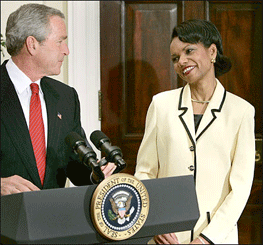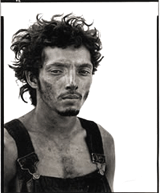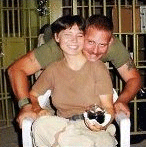Home Mail
Articles
Stats/current
Supplements
Subscriptions
Radio
The following article appeared in Left Business Observer #108, July 2004. It retains its copyright and may not be reprinted or redistributed in any form - print, electronic, facsimile, anything - without the permission of LBO.
Masculinity, oil, war, torture
This is an edited version of an interview with Cynthia Enloe that ran on Doug Henwood’s radio show on May 20, 2004 (original here). Enloe teaches political science at Clark University, and has written widely on militarism, power, and the lives of women. Among her books are Maneuvers and Bananas, Beaches, and Bases.
 With some important exceptions, the Bush administration looks very macho—Bush’s Texas swagger, Rummy’s tough wrestler act, Cheney’s cruel sneer. Is this an important part of their politics?
With some important exceptions, the Bush administration looks very macho—Bush’s Texas swagger, Rummy’s tough wrestler act, Cheney’s cruel sneer. Is this an important part of their politics?
It’s an important part of virtually all American presidential politics. They don’t have a corner on the market, but it’s quite particular in the Bush administration. My sense is that they compare themselves in their manliness not with just the Clinton Administration, but also with what they imagine was not the “sufficient manliness” of George Bush Sr. There are varieties of masculinities within the Bush administration and they are set up in contest with each other. Rumsfeld’s constructs of masculinity, which come pretty close to Cheney’s, don’t seem to me as the same as George W. Bush’s. They may be complimentary and they may be useful to each other but I don’t think they’re the same.
There are varieties of masculinities within the Bush administration and they are set up in contest with each other. Rumsfeld’s constructs of masculinity, which come pretty close to Cheney’s, don’t seem to me as the same as George W. Bush’s. They may be complimentary and they may be useful to each other but I don’t think they’re the same.
How are they different?
My sense is that George W. Bush has a hail fellow well-met comfort zone that is about all that jokiness. That’s not automatically appalling, but it can be when it’s about serious topics. But it’s very much part of his way of being manly in both public and private relationships. Paul O’Neill, the former Secretary of the Treasury, was quite put off by that. It doesn’t work in all efforts to bond around maleness. There’s also of course now the kind of evangelical manliness, being somebody of moral resolution—which isn’t the same as being of analytical resolution—which seems very important to Bush’s manly self-image. He seems to really like, and feel comfortable in the company of women, and not necessarily unintelligent women.
Rumsfeld and Cheney—and this isn’t trivial, it’s quite serious—seem to have adopted kind of a masculine identity, a masculine way of negotiating with each other, that is very much more about saying little, not being jokey, but rather very combative, assuming that you can wield silence as much as you can wield camaraderie. And they may be useful to each other, but not the same. Sometimes they compliment each other and work for the whole hierarchy’s operation, and sometimes they don’t. Both Bush and Cheney-Rumsfeld find it useful to try and feminize Colin Powell, which is pretty hard to do with somebody who has been a general. But they can do it because of the long history of trying to feminize the State Department in American inner circles.
You mean that State is more analytical and reflective, and not driven by determination and action?
Yes. Bob Woodward’s book is very helpful here. Listening to how Bush talks, to how Rumsfeld and Cheney talk, it seems to me that their notion of unmanliness is anything that is tolerant of messiness, anything that engages with what they refer to as “noise”. “Noise” seems to be what we would think of as democracy. But their masculinized notions of resoluteness, of tough-mindedness, have to do with the opposite of what the State Department, in its own bureaucratic mission, must be engaged in—complex negotiation, long, ongoing debate, and acceptance of varieties of points of view. That’s what Bush, Rumsfeld and Cheney, those in particular, are very uncomfortable with, and therefore feminize.
If you read O’Neill’s book, he thought the administration’s atmosphere was going to be like a large corporation; he accepted the Treasury appointment because he thought he and Cheney, as former CEOs, were of like minds. But once he got in, he found the things he valued were missing—open debate, facing complexity, digging into the complexity. Just before he left, he found Colin Powell and Christie Whitman of the Environmental Protection Agency the most compatible members of the cabinet. So masculinity can be quite surprising in its varieties, in who finds themselves compatible with whom. But in the Bush administration, what gets feminized is the messiness of democracy.
But also, as you pointed out, they do define themselves against Clinton, who seems feminine and weak and sensual. What about that contrast?
They do, and in an interesting way it’s not just about military service. Of course with the three, with those three, Cheney, Rumsfeld and Bush, it is very hard to have military service be the defining characteristic. So they take on what they think are the attributes of the military—not to be confused with having ever served in the military—but they take on a militaristic culture of masculinity, and that’s how they compare themselves with Clinton.
Maureen Dowd, the New York Times columnist, has said several times that this Bush administration, at the very senior levels, has as its most salient comparison the first Bush administration.
Laura Flanders has written a book about the Bush women, and other people have also noted the prominence of powerful women in the administration. Karen Hughes goes way back with W, and there’s the very intimate relation with Condoleeza Rice, who had that slip of the tongue a couple weeks ago where she started referring to George Bush as her husband. How do they figure into this?
Right, and let’s add in Lynne Cheney there too, and Laura Bush. Laura Flanders’ book, Bushwomen, is just excellent. One of the things that Laura Flanders says is that a lot of us—those of us who think of ourselves as having some kind of a feminist-informed curiosity—have been dismissive of Hughes, Rice, Lynne Cheney, Laura Bush. In that book, she’s critical of every one of them, and she says, “Let’s all be seriously curious about each of them.” And they’re not all lookalikes. They come out of different political backgrounds, different professional backgrounds, they have different kinds of ties to Bush himself. They have different kinds of ties to corporations. And let’s take them seriously, and then watch the role that each of them plays in the administration.
Laura Bush. Laura Flanders’ book, Bushwomen, is just excellent. One of the things that Laura Flanders says is that a lot of us—those of us who think of ourselves as having some kind of a feminist-informed curiosity—have been dismissive of Hughes, Rice, Lynne Cheney, Laura Bush. In that book, she’s critical of every one of them, and she says, “Let’s all be seriously curious about each of them.” And they’re not all lookalikes. They come out of different political backgrounds, different professional backgrounds, they have different kinds of ties to Bush himself. They have different kinds of ties to corporations. And let’s take them seriously, and then watch the role that each of them plays in the administration.
It is interesting that Bush is so seemingly comfortable with Condoleeza Rice and his wife Laura Bush and Karen Hughes. They each play different roles in his way of feeling comfortable in the office and trying out ideas. My sense is that none of the three of them really challenge him on things that he has seemingly become convinced of. Karen Hughes really will say, “No, that media approach won’t work,” or, “We’ve got to pay more attention to….” But my sense is that none of the three of them really seriously challenge him. It could be that Laura Bush does but we don’t know. I heard Cokie Roberts say once not long ago on radio, just offhandedly, that from what she hears, it’s a good thing that Laura Bush does voice her opinion in private on certain issues.
Some people might listen to our conversation and say, yeah, this is all very interesting but it’s really all about oil or power or money. How do you respond?
And I think it myself sometimes! Unlike George Bush, who says, “I never have discussions with myself,” one often does. Most of us ask ourselves if we’re giving too much weight to the thing that we’ve decided to home in on. It’s a healthy thing.
But here’s what I’ve learned. I certainly went too long without taking the politics of masculinity and femininity—sometimes referred to as the politics of gender, but that’s a little too bland—as seriously as I should. I watched armies, I watched rank in armies, I watched ethnicity, I watched bureaucratic status and placement, all of it, in Malaysia, the U.S., Canada, the Soviet Union, and Nigeria. Once I was nudged into taking a lot more seriously the politics of masculinity and the politics of femininity, I found not that I no longer paid attention to ethnicity, not that I no longer paid attention to financial interests, not that I no longer paid attention to aspirations of power, but rather that all of those are infused with negotiations over, contests between, and attempts to manipulate ideas about masculinity and ideas about femininity.
So I don’t do the either/or. I get very nervous when somebody thinks that they can talk about oil politics, either in the United States or internationally, and not talk about masculinity. Oil politics—
As they say in the business, it’s all about punching holes in the ground.
Yeah, exactly. But even that kind of shorthand completely underestimates why oil workers are among the m ost effectively unionized and carry a lot of political weight in a number of counties. You can’t make sense of, for instance, Mexican oil politics unless you talk about the oil workers’ union. And the oil workers’ union is powerful in part because it is such a masculinized actor in Mexican politics. But the same thing is true of, whether it be Texas politics or Alaskan politics, the association of the oil industry with a certain kind of legitimated, not just traditional but seemingly very modern, masculinity. It’s one of the things that makes oil politics, not just the money. It is really different than being associated with the textile industry, or the industrial cleaning industry. So I don’t want to dismiss the money, I don’t want to dismiss the territory, I don’t want to dismiss the corporate organizational factors going on here, but take away masculinity, and I actually don’t think we can make full sense of oil politics.
ost effectively unionized and carry a lot of political weight in a number of counties. You can’t make sense of, for instance, Mexican oil politics unless you talk about the oil workers’ union. And the oil workers’ union is powerful in part because it is such a masculinized actor in Mexican politics. But the same thing is true of, whether it be Texas politics or Alaskan politics, the association of the oil industry with a certain kind of legitimated, not just traditional but seemingly very modern, masculinity. It’s one of the things that makes oil politics, not just the money. It is really different than being associated with the textile industry, or the industrial cleaning industry. So I don’t want to dismiss the money, I don’t want to dismiss the territory, I don’t want to dismiss the corporate organizational factors going on here, but take away masculinity, and I actually don’t think we can make full sense of oil politics.
Let’s turn to the images of torture in which women feature so prominently. This has been a field day for the right who say this is proof that we shouldn’t have women in the military. Some people are expressing broken-heartedness over seeing women involved in such cruelty because they’re essentially good and pure and something terrible has happened. How do you sort it all out?
One should be broken-hearted over anybody torturing any other human being. That should be the thing that breaks one’s heart, collectively and personally. But we know that women in fact are complicated people, just as men are, and if they are put in positions where they are isolated, where they are dependent on fitting into a highly masculinized organization—and I don’t mean just the military, I mean a particular prison hierarchy—they will act in certain ways. And if there are people up above who want to make use of femininity as a way to not just humiliate but torture a male prisoner, women will be there and will be used. The people who’ve taught us about how masculinity and femininity are both wielded in torture, of course, are particularly Latin American feminists. My colleague—somebody I have learned from and admire—Ximena Bunster, a Chilean anthropologist, has written one of the few books we have on the minute ways in which femininity and masculinity where wielded by the Pinochet torturers. But we also have studies out of Israel and from human rights groups.
mean just the military, I mean a particular prison hierarchy—they will act in certain ways. And if there are people up above who want to make use of femininity as a way to not just humiliate but torture a male prisoner, women will be there and will be used. The people who’ve taught us about how masculinity and femininity are both wielded in torture, of course, are particularly Latin American feminists. My colleague—somebody I have learned from and admire—Ximena Bunster, a Chilean anthropologist, has written one of the few books we have on the minute ways in which femininity and masculinity where wielded by the Pinochet torturers. But we also have studies out of Israel and from human rights groups.
This is not new, to wield femininity in the name of a masculinized, controlled and male-led torture system. We know a lot about this. Yes, it is shocking, yes I have absolutely been horrified to see both men and women in Abu Ghraib used as operators of torture. Let’s think about that famous horrifying photograph of Iraqi men who’ve been stripped naked and piled on top of each other, and Lynndie England, seemingly grinning, we think, at the camera. We’re not sure what’s motivating her here. And there’s Charles Graner standing behind with his arms crossed and wearing blue gloves, also smiling. I look at that whole picture and I try to understand not just England, but what Graner is thinking. Graner is a corporal, her superior, the one who has made her pregnant. That’s a very complicated picture. And who is behind the camera? And since it’s a posed picture, who posed the whole thing, for what objective, imagining what about Iraqi masculinities?
Seymour Hersh says that the photos were taken to blackmail the men who were photographed into becoming informants, because if the images were circulated, it could ruin them.
We’re beginning to learn that photographs are widely used in intelligence operations, not only in Iraq but in Afghanistan and in Guantánamo. Photographing prisoners seems to be used as a means to intimidate, blackmail, humiliate. That means somebody has brought in all the cameras, somebody is holding on to a lot of the photographs, and somebody dreamed this up as an idea that would serve “intelligence” purposes.
One of the things we’ve learned from feminist art historians, and feminist historians of photography is that when you see photographs that are posed, you always ask who did the posing, what did they imagine about femininity and masculinity (even if it’s all men or all women in the photos) when they created that pose, and who’s behind the camera. We’re just beginning to figure out the gendered politics of those photographs.
In light of what you’ve just said, what do you make of the bad apples defense? Is this a couple of low level people on a frolic of their own or do you think this was scripted by professionals?
What we need to do is ask that question, and then ask it again, and then ask it again. We know from every assassination attempt, from every corruption behavior that’s been revealed anywhere that the favorite response to try to dampen our collective and individual curiosities is to say, “That is an exception.”
What we’ve all learned from Tailhook and from the Air Force Academy rape revelations and from Watergate and from My Lai, what we’ve learned but what we need to keep relearning is: always ask about the entire organizational decision-making process, the entire institutional culture. What is considered normal? What’s considered trivial? What’s considered allowable? What’s considered outrageous? Feminists have become very smart about this because they have had to learn all these skills to find out how sexual harassment happens in a law firm or in an automobile manufacturer, or in the military. At the top and in the middle of an organization, the directives that cumulatively make up the culture look either benign or bland or “civilized”, “rational”, “modern”, if you will, “suited”.
Whereas, further down in the hierarchy, the actions taken to carry out those instructions from above look cruder, more obvious, more blatant. It doesn’t mean that the people, the men and women, that is both Charles Graner and Lynndie England, and their compatriots in the military police unit, in the reservists unit, it doesn’t mean they shouldn’t be held accountable. They absolutely should be, but that’s the beginning of the story, not the end of the story. The further up the chain of command we get, the blander the instructions will sound. We’ve really got to learn how to be outraged at things that, at first hearing, sound bland.
Home Mail
Articles
Stats/current
Supplements
Subscriptions
Radio
 There are varieties of masculinities within the Bush administration and they are set up in contest with each other. Rumsfeld’s constructs of masculinity, which come pretty close to Cheney’s, don’t seem to me as the same as George W. Bush’s. They may be complimentary and they may be useful to each other but I don’t think they’re the same.
There are varieties of masculinities within the Bush administration and they are set up in contest with each other. Rumsfeld’s constructs of masculinity, which come pretty close to Cheney’s, don’t seem to me as the same as George W. Bush’s. They may be complimentary and they may be useful to each other but I don’t think they’re the same. Laura Bush. Laura Flanders’ book, Bushwomen, is just excellent. One of the things that Laura Flanders says is that a lot of us—those of us who think of ourselves as having some kind of a feminist-informed curiosity—have been dismissive of Hughes, Rice, Lynne Cheney, Laura Bush. In that book, she’s critical of every one of them, and she says, “Let’s all be seriously curious about each of them.” And they’re not all lookalikes. They come out of different political backgrounds, different professional backgrounds, they have different kinds of ties to Bush himself. They have different kinds of ties to corporations. And let’s take them seriously, and then watch the role that each of them plays in the administration.
Laura Bush. Laura Flanders’ book, Bushwomen, is just excellent. One of the things that Laura Flanders says is that a lot of us—those of us who think of ourselves as having some kind of a feminist-informed curiosity—have been dismissive of Hughes, Rice, Lynne Cheney, Laura Bush. In that book, she’s critical of every one of them, and she says, “Let’s all be seriously curious about each of them.” And they’re not all lookalikes. They come out of different political backgrounds, different professional backgrounds, they have different kinds of ties to Bush himself. They have different kinds of ties to corporations. And let’s take them seriously, and then watch the role that each of them plays in the administration. ost effectively unionized and carry a lot of political weight in a number of counties. You can’t make sense of, for instance, Mexican oil politics unless you talk about the oil workers’ union. And the oil workers’ union is powerful in part because it is such a masculinized actor in Mexican politics. But the same thing is true of, whether it be Texas politics or Alaskan politics, the association of the oil industry with a certain kind of legitimated, not just traditional but seemingly very modern, masculinity. It’s one of the things that makes oil politics, not just the money. It is really different than being associated with the textile industry, or the industrial cleaning industry. So I don’t want to dismiss the money, I don’t want to dismiss the territory, I don’t want to dismiss the corporate organizational factors going on here, but take away masculinity, and I actually don’t think we can make full sense of oil politics.
ost effectively unionized and carry a lot of political weight in a number of counties. You can’t make sense of, for instance, Mexican oil politics unless you talk about the oil workers’ union. And the oil workers’ union is powerful in part because it is such a masculinized actor in Mexican politics. But the same thing is true of, whether it be Texas politics or Alaskan politics, the association of the oil industry with a certain kind of legitimated, not just traditional but seemingly very modern, masculinity. It’s one of the things that makes oil politics, not just the money. It is really different than being associated with the textile industry, or the industrial cleaning industry. So I don’t want to dismiss the money, I don’t want to dismiss the territory, I don’t want to dismiss the corporate organizational factors going on here, but take away masculinity, and I actually don’t think we can make full sense of oil politics. mean just the military, I mean a particular prison hierarchy—they will act in certain ways. And if there are people up above who want to make use of femininity as a way to not just humiliate but torture a male prisoner, women will be there and will be used. The people who’ve taught us about how masculinity and femininity are both wielded in torture, of course, are particularly Latin American feminists. My colleague—somebody I have learned from and admire—
mean just the military, I mean a particular prison hierarchy—they will act in certain ways. And if there are people up above who want to make use of femininity as a way to not just humiliate but torture a male prisoner, women will be there and will be used. The people who’ve taught us about how masculinity and femininity are both wielded in torture, of course, are particularly Latin American feminists. My colleague—somebody I have learned from and admire—